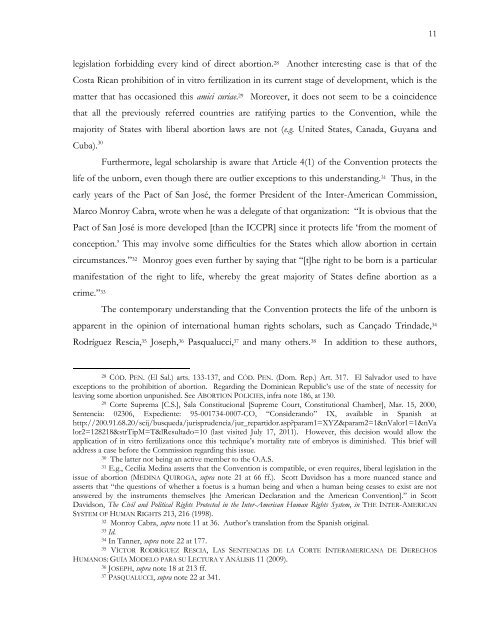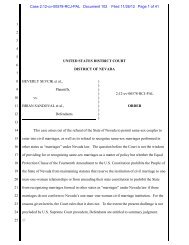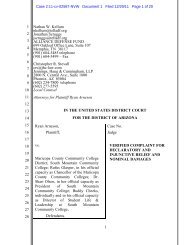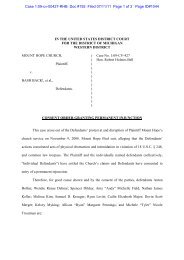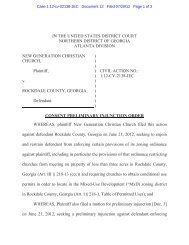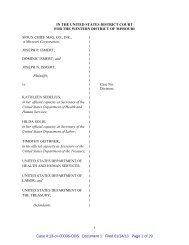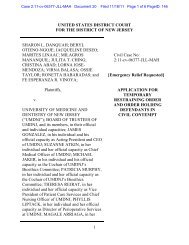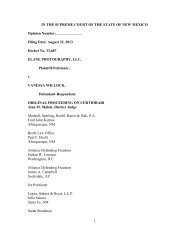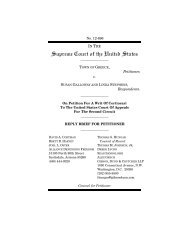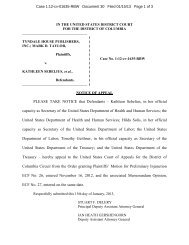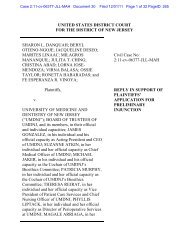English - Alliance Defending Freedom Media
English - Alliance Defending Freedom Media
English - Alliance Defending Freedom Media
You also want an ePaper? Increase the reach of your titles
YUMPU automatically turns print PDFs into web optimized ePapers that Google loves.
Cuba). 30 Furthermore, legal scholarship is aware that Article 4(1) of the Convention protects the<br />
11<br />
legislation forbidding every kind of direct abortion. 28 Another interesting case is that of the<br />
Costa Rican prohibition of in vitro fertilization in its current stage of development, which is the<br />
matter that has occasioned this amici curiae. 29 Moreover, it does not seem to be a coincidence<br />
that all the previously referred countries are ratifying parties to the Convention, while the<br />
majority of States with liberal abortion laws are not (e.g. United States, Canada, Guyana and<br />
life of the unborn, even though there are outlier exceptions to this understanding. 31 Thus, in the<br />
early years of the Pact of San José, the former President of the Inter-American Commission,<br />
Marco Monroy Cabra, wrote when he was a delegate of that organization: “It is obvious that the<br />
Pact of San José is more developed [than the ICCPR] since it protects life ‘from the moment of<br />
conception.’ This may involve some difficulties for the States which allow abortion in certain<br />
circumstances.” 32 Monroy goes even further by saying that “[t]he right to be born is a particular<br />
manifestation of the right to life, whereby the great majority of States define abortion as a<br />
crime.” 33<br />
The contemporary understanding that the Convention protects the life of the unborn is<br />
apparent in the opinion of international human rights scholars, such as Cançado Trindade, 34<br />
Rodríguez Rescia, 35 Joseph, 36 Pasqualucci, 37 and many others. 38 In addition to these authors,<br />
28 CÓD. PEN. (El Sal.) arts. 133-137, and CÓD. PEN. (Dom. Rep.) Art. 317. El Salvador used to have<br />
exceptions to the prohibition of abortion. Regarding the Dominican Republic’s use of the state of necessity for<br />
leaving some abortion unpunished. See ABORTION POLICIES, infra note 186, at 130.<br />
29 Corte Suprema [C.S.], Sala Constitucional [Supreme Court, Constitutional Chamber], Mar. 15, 2000,<br />
Sentencia: 02306, Expediente: 95-001734-0007-CO, “Considerando” IX, available in Spanish at<br />
http://200.91.68.20/scij/busqueda/jurisprudencia/jur_repartidor.asp?param1=XYZ¶m2=1&nValor1=1&nVa<br />
lor2=128218&strTipM=T&lResultado=10 (last visited July 17, 2011). However, this decision would allow the<br />
application of in vitro fertilizations once this technique’s mortality rate of embryos is diminished. This brief will<br />
address a case before the Commission regarding this issue.<br />
30 The latter not being an active member to the O.A.S.<br />
31 E.g., Cecilia Medina asserts that the Convention is compatible, or even requires, liberal legislation in the<br />
issue of abortion (MEDINA QUIROGA, supra note 21 at 66 ff.). Scott Davidson has a more nuanced stance and<br />
asserts that “the questions of whether a foetus is a human being and when a human being ceases to exist are not<br />
answered by the instruments themselves [the American Declaration and the American Convention].” in Scott<br />
Davidson, The Civil and Political Rights Protected in the Inter-American Human Rights System, in THE INTER-AMERICAN<br />
SYSTEM OF HUMAN RIGHTS 213, 216 (1998).<br />
32 Monroy Cabra, supra note 11 at 36. Author’s translation from the Spanish original.<br />
33 Id.<br />
34 In Tanner, supra note 22 at 177.<br />
35 VÍCTOR RODRÍGUEZ RESCIA, LAS SENTENCIAS DE LA CORTE INTERAMERICANA DE DERECHOS<br />
HUMANOS: GUÍA MODELO PARA SU LECTURA Y ANÁLISIS 11 (2009).<br />
36 JOSEPH, supra note 18 at 213 ff.<br />
37 PASQUALUCCI, supra note 22 at 341.


